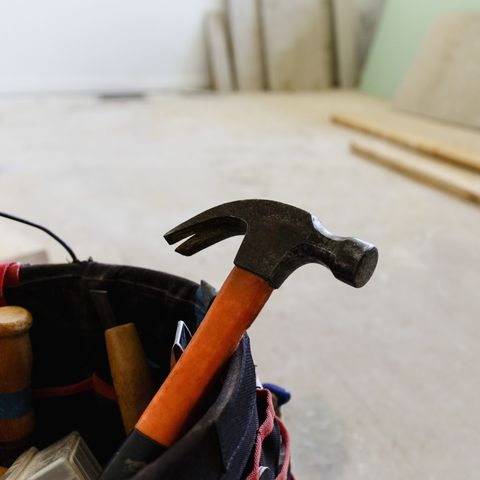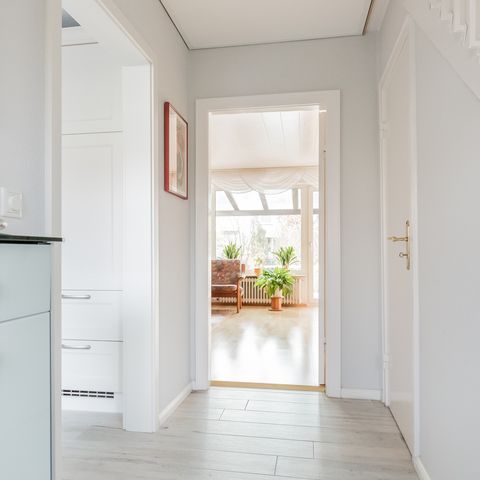Coronavirus lockdown: Can builders still work on your house renovation project?
Thousands of homeowners face months of uncertainty as COVID-19 impacts on their home improvement projects. Here’s what to do if you’re affected.
Only builders doing jobs 'critical to the nation and to the life of the economy should continue to work' during the coronavirus crisis, says Cabinet minister Michael Gove. He’s telling the public that carrying out construction tasks involving 'intimate contact in someone’s home', including renovations on a house where the occupants are still living, would be 'inappropriate'.
But the guidelines for residential projects are not clear enough, say homeowners, builders and architects. What are you supposed to do this week if you’re in the middle of a major renovation project such as a kitchen extension or loft conversion?
Is your project essential?
This is the big issue. So far, the government has not made the definition of 'essential' building work explicit. The latest government advice (updated 26th March), explains: 'Work carried out in people's homes, for example by tradespeople carrying out repairs and maintenance, can continue, provided that the tradesperson is well and has no symptoms.' Of course, in this instance, social distancing guidelines should be adhered to for everyone’s safety.
Hayley Lorimer, director of membership services, at Federation of Master Builders, explains: 'Any work that is required to achieve a secure and weatherproof site with materials safely stored counts as critical work and can be carried out, whilst taking all possible precautions as per NHS advice. This includes ensuring that any heating systems are working, and dealing with any issues of water ingress.'
The rules
Safe social distancing practices should be enforced, says Joseph Brown, a senior architect specialising in domestic work at north London practice Amos Goldreich Architecture. On his still-active projects, he’s implementing the following:
• The site should be limited to as few workers as possible and all should be practising safe social distancing measures at all times (two-metre distance between each other).
• The workers coming to the site will not be using public transport and will only arrive by car or van.
• If the above cannot be sustained all works on site should be paused. The ongoing works should be reviewed to enable the above where possible.
• Anyone showing even mild COVID-19 symptoms should not be on site and in line with government guidelines should remain at home for 14 days.
What if your household is self-isolating?
The government advice on this is clear: 'No work should be carried out in any household which is isolating or where an individual is being shielded, unless it is to remedy a direct risk to the safety of the household, such as emergency plumbing or repairs, and where the tradesperson is willing to do so. In such cases, Public Health England can provide advice to tradespeople and households.' Find further information at gov.uk.
Protecting your project
If closure is no option – for instance, if safe social distancing practices can’t be maintained, or the build team cannot work for any other reason, including illness – the contractor has a duty to ensure all openings are secure, boarded and watertight before leaving the site permanently. 'Also, where possible, all access routes to a site should also be boarded and secured and materials safely stored. This is standard practice and should be unaffected by the COVID-19 pandemic,' says Joseph Brown.
If your home ends up under temporary security protection such as boards and sheeting to cover missing exterior walls or roofs, you must inform your buildings and contents insurance provider. Failure to do so could invalidate your policy.
Insurance details
Your builders' Public Liability insurance should be kept in place until any building work is completed, so check with them that this is happening.
Go through the terms and conditions of your building contract with them – all reputable builders should not start a project without one. 'The most important thing people can do at the moment is check the force majeure clauses in their contracts,' advises Jake Newport, managing director of Finnmark Sauna, which supplies and installs home leisure products.
Securing your contract
Taking care to do this now is important, because it will impact on how quickly work can resume in future. Be prepared to be flexible, now is not the time to rely solely on every single one of its terms. Above all, you and your builder must safeguard your health and best interests. 'You can either end the existing contract and draw up a new one, or suspend and reschedule the works within the existing contract,' says Hayley Lorimer. 'Whatever is agreed should be put in writing and signed by both parties, which can be done via email to avoid contact.'
Keep your builder onside
During the shut-down period, keep in touch remotely by email and phone, so that everyone is updated on how things are going and when the likelihood of work resuming might be.
And pay outstanding invoices. 'This will be essential to your builder’s cash-flow,' says Hayley Lorimer. 'It will also give them the best chance of staying in good financial shape so that they are there ready to complete the project when the time comes.'
Leave it to the professionals
Apart from finishing-off DIY tasks such as painting and decorating, never attempt to undertake any major work yourself. This includes structural alterations and gas and electricity installations, which should only be carried out by qualified and accredited individuals.
If you do make an attempt, it will mean your project will not meet Building Regulations. The work will have to be re-done as a matter of urgency by a qualified tradesperson or you may invalidate your building insurance policy and/or face prosecution.
Also, there are potential legal issues if you come to sell your home as you need certificates of completion to prove certain work - including gas and electricity installations - has been done by a professional. Find out more at gov.uk.
source:-https://www.housebeautiful.com/







No comments:
Post a Comment